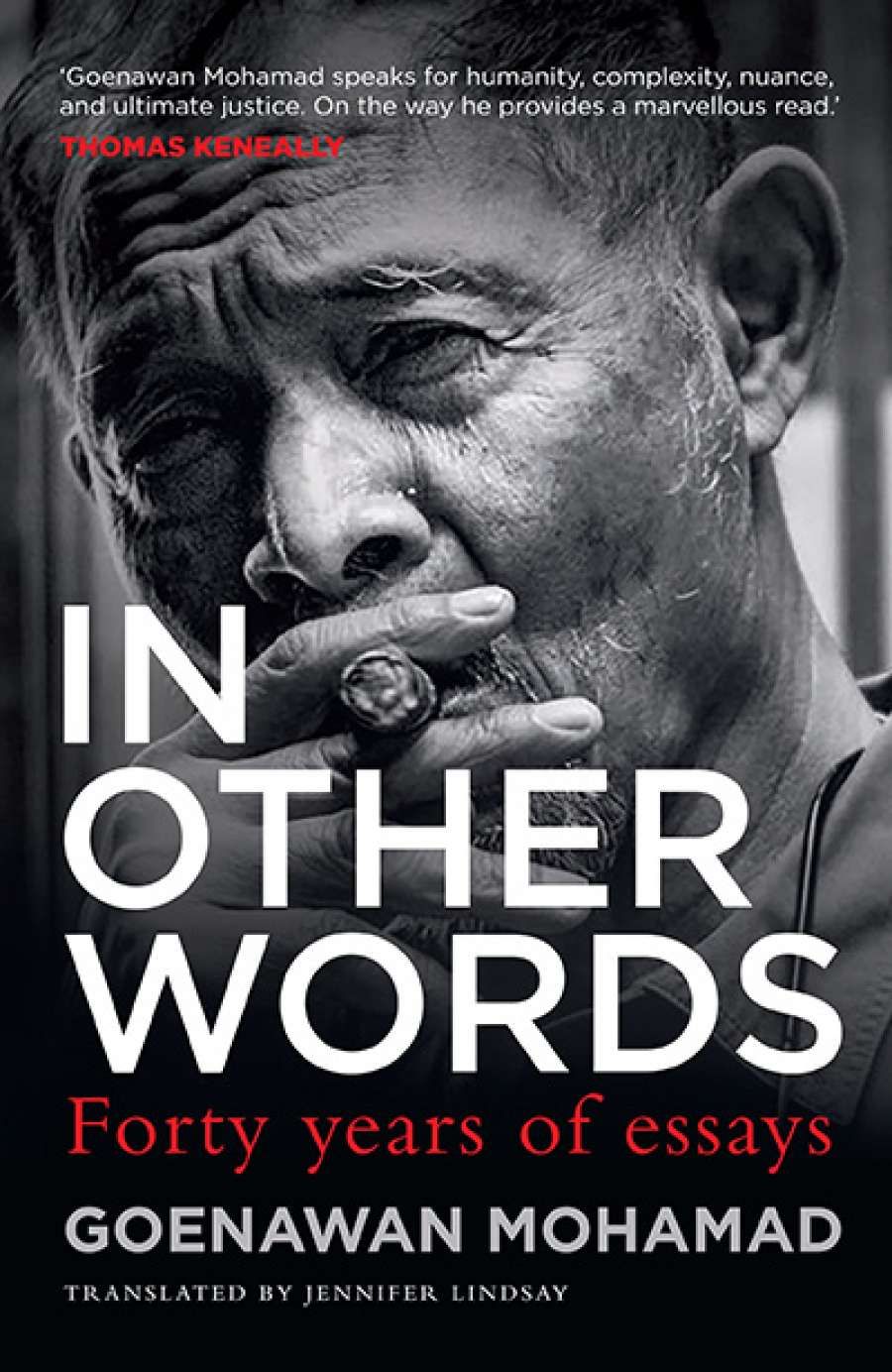
- Free Article: No
- Contents Category: Essay Collection
- Custom Article Title: Satendra Nandan reviews 'In other words: Forty years of essays' by Goenawan Mohamad, translated by Jennifer Lindsay
- Review Article: Yes
- Online Only: No
- Custom Highlight Text:
Goenawan Mohamad has been a formidable Indonesian journalist for half a century, chiefly as the founder and editor of the weekly Tempo. He is also the ...
- Book 1 Title: In other words
- Book 1 Subtitle: Forty years of essays
- Book 1 Biblio: NewSouth $34.99 pb, 374 pp, 9781742235158
Indonesia is now the third-biggest functioning democratic country, after India and the United States. It is also the largest Muslim state in the world. Significantly, this huge archipelagic nation is our closest neighbour. Asylum seekers come to our shores via Indonesian seas and islands. 'Stopping the boats' is not necessarily the beginning of our enlightenment. More bridges of understanding between institutions and thinkers, and serious intellectual engagement and reading, are essential if we are to comprehend a unique civilisation with relics of Hindu-Buddhist-animist cultures. Islam came to Indonesia in the fifteenth century, followed by Dutch colonialism that lasted for three hundred years, then three years of Japanese occupation during World War II, followed by Sukarno's brand of nationalism, which was finally overrun by Suharto's prolonged military dictatorship. It is a complicated history of a palimpsestic culture full of the trials of history, and one that needs a voice like Mohamad's to articulate it with understanding, empathy, and uncompromising insight.
This fascinating collection of essays was selected by Mohamad's avid reader and translator, Jennifer Lindsay (whose ABR Fellowship essay on Mohamad, 'Man on the Margins', appeared in the October 2012 issue of ABR). It is arranged in three interrelated sections – 'Indonesia on my Mind', 'Wider Worlds', 'Mythic and Sacred' – with a fine foreword by Terence Ward, a writer and documentary producer with cultural-political interests in Indonesia. The essays are on a variety of subjects, ranging from 1968 to 2014. Mohamad is a highly erudite public intellectual of his country and a genuine thinker. These essays, originally written in Bahasa Indonesia, show a writer for whom everything human is his heritage – nothing human is alien.
Normally, the reaction of many post-colonial nationalists is to reject all imperial powers imposed on the native states and peoples: and yet many modern institutions, the very idea of a nation-state, even writing, have come to many of us from these imperial encounters, often brutal. If the bee sucked the nectar, it also pollinated the flower and new fruits were possible. The republic of the imagination has no borders; one senses this in the varied subjects on which Mohamad has written: no topic is too small for his lively mind and free spirit – from literature to life, politics to poetics, mythology to modernism, and, above all, his passion for books and writers, reading and writing, and travel.
The volume begins with his first essay on 'Books'. Mohamad recalls his nationalist father being arrested and shot and the Dutch soldiers throwing two books in the well: Mohamad was barely six years old in 1947, but the memory is sharp.
 Goenawan MohamadMohamad's essay on 'Indonesia' begins starkly: 'Sometimes I wonder what possibly could have crossed my father's mind in the few moments before he was executed.' That is poignant enough, but then he continues, 'perhaps it is because homeland is memory and hope that involves the body: remembered fragrance of rice, the after taste of spices, the swift current that cannot be forgotten, the sound of father's praise, a mother's soothing song, grandfather's cough, and the children's stories that settle deep in the consciousness. And hope ...' Often in such ordinary details the humanity within us survives. In Other Words shows us how other worlds exist so close to us, even within us.
Goenawan MohamadMohamad's essay on 'Indonesia' begins starkly: 'Sometimes I wonder what possibly could have crossed my father's mind in the few moments before he was executed.' That is poignant enough, but then he continues, 'perhaps it is because homeland is memory and hope that involves the body: remembered fragrance of rice, the after taste of spices, the swift current that cannot be forgotten, the sound of father's praise, a mother's soothing song, grandfather's cough, and the children's stories that settle deep in the consciousness. And hope ...' Often in such ordinary details the humanity within us survives. In Other Words shows us how other worlds exist so close to us, even within us.
Reading these essays raises several stimulating issues: the potency of the essay in newspapers and magazines; the immense value of translation; the necessity of reading these writers in English in the region; the teaching of literatures in English and the global reach of a great language; and how we might make Australia a more exciting place for writers and intellectuals in exile, who often pay a heavy price for their thoughts. One might also ponder the silence of some academics who seldom question what is happening in certain countries in our own region.
Economic imperatives and political expediency seems to be the major motivations in our relations with the repressive regimes of the region. But that is no longer enough: some writers like Goenawan Mohamad tell us why – in their own words.


Comments powered by CComment